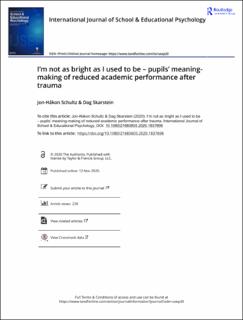I’m not as bright as I used to be – pupils’ meaning making of reduced academic performance after trauma
Peer reviewed, Journal article
Published version
Permanent lenke
https://hdl.handle.net/11250/2759759Utgivelsesdato
2020-11-12Metadata
Vis full innførselSamlinger
Originalversjon
International Journal of School & Educational Psychology. 2020, (1-15). https://doi.org/10.1080/21683603.2020.1837698Sammendrag
Post-traumatic stress disorder (PTSD) is associated with temporary, distinct cognitive impairment. This study explores how cognitive impaired academic performance is recognized and explained by young Norwegians who survived the Utøya massacre of July 22, 2011. Qualitative interviewing of 65 students (aged 16–29 years) was conducted 2.5 years after the traumatic event. A total of 25% (n = 16) respondents reported no or no distinct change; only 6% (n = 4) reported some degree of positive change. By contrast, 69% (n = 45) reported negative changes in academic performance, with impaired concentration and feelings of chaos. Previously effective study techniques became less effective or inadequate. Respondents worried about lasting impairment of academic functioning, but reported little or no discussion with teachers. From the characteristics of the changes reported, attribution style, the use of metaphors and narrative structuring, we identify differences in the meaning-making processes of these young people. Some were left with an understanding that negatively affected their help-seeking activity and reduced the willingness to accept adapted education post trauma.

